LATEST NEWS


Last week California began accepting applications for the first round of the new film and TV tax credit, which policy makers in Sacramento had beefed up to try and lure film production back to the state. The legislature passed a five-year, $1.65 billion film tax incentive program last year, and with the revamped tax credit program up and running, many entertainment workers throughout California are feeling something not felt in a long time: Hope. For the first time in 15 years, the program feels better equipped to keep our suffering entertainment industry from flatlining and to revive the iconic “Hollywood brand” to its former greatness.
For every dollar a musician earns, nearly $2 are put into the California economy.
However, not everyone has cause to celebrate. Thousands of California’s post-production workers, including recording musicians, are still shortchanged by the tax credit program,
» Read more about: A Bill to Save Jobs for California Musicians »


A common refrain among opponents of clean air, water and endangered species is that environmental regulation kills jobs. From some perspectives, they’re occasionally right: Go talk to a coal miner in Kentucky staring down the Obama administration’s new rules for reducing greenhouse gas emissions from new power plants, or an Oregon tree-feller on the topic of spotted owls. When rules to protect nature and public health kick in, whole economies sometimes die.
But it’s also true that people living in poverty suffer disproportionately from industrial pollution, and that wealth benefits from the long-term protection of resources — without restraint, after all, one day there’d be no forests to log. So a United Nations’ Brundtland Commission in 1987 proposed another way of looking at the situation, one that wouldn’t pit laudable values against each other, but would instead regard economic and environmental health as inseparable. The Brundtland participants coined the term “sustainable development” and,
» Read more about: Jobs & the Environment: An L.A. County Report Card »


“Absolutely not. In fact, if I could increase it, I would,” said Nestlé Waters North America CEO Tim Brown Wednesday on KPCC, when asked by NASA hydrologist Jay Famiglietti whether he would ever consider moving his water bottling operations out of drought-stricken California, like Starbucks is doing. By Brown’s estimate, Nestlé’s bottling business currently uses 700,000,000 gallons of California groundwater a year.
Nestlé isn’t the only company draining California’s aquifers and shipping the water out of state in the middle of a megadrought. In fact, as I reported here this week, the Crystal Geyser Water Company is getting ready to open up a brand new operation in Mount Shasta, at the headwaters of the Sacramento River. And, just down the road from the Crystal Geyser site, plans are being drawn up to build yet another, “boutique”
» Read more about: 700 Million Gallons of California Groundwater Isn't Enough for Nestlé »


In his budget proposal unveiled Thursday, Governor Jerry Brown proposed a state version of a program that has proven extremely helpful at lifting families out of poverty. Unfortunately, the threshold in Brown’s proposal would be absurdly low – leaving the few it would reach still languishing well below the poverty line.
The Federal Earned Income Tax Credit (EITC) is a highly effective anti-poverty program. The Brookings Institute estimates that the EITC kept 6.2 million Americans out of poverty annually between 2011-13, including 747,000 Californians.
It works by providing low-income residents with a tax credit, either lowering taxes or providing a refund for those whose incomes are so low that they owe little or no income tax. The credit varies by income and number of children in a family, and is designed to provide a boost to the poorest, while still providing an incentive to work.
In 2009, as the U.S. economy teetered on the brink of catastrophe, a newly elected Barack Obama leaned heavily on the counsel of a small circle of experts. Perhaps the most unlikely member of Obama’s inner sanctum, which included Larry Summers, Timothy Geithner, Christina Romer and Peter Orszag, was Jared Bernstein, a meditation devotee and professionally trained musician with a PhD in social welfare.
Chosen by Joe Biden to be the Vice President’s top economic advisor, Bernstein had distinguished himself as a passionate critic of inequality during his long tenure at the Economic Policy Institute, one of the country’s leading think tanks. His views on economic issues were well to the left of Obama’s and the rest of the President’s team, ensuring that progressive ideas would get a hearing inside the White House as the administration wrestled with the worst downturn since the Great Depression.
While Obama and his advisors succeeded in reversing the Great Recession’s massive job losses and saving the bacon of the financial industry,


California is earthquake country but one seismic shift rumbling through the state won’t require bottled water and a three-day food supply.
That would be the political and demographic groundswell toward challenging elements of Proposition 13, the property tax measure passed by California voters in 1978 by a landslide and which has been considered untouchable ever since.
“Prop. 13 has been a contentious part of the political landscape for 40 years,” says John Kim of the Advancement Project, one of the organizations comprising Make It Fair, a coalition of 22 statewide organizations and 200 endorsers seeking Prop. 13 reforms.
The watershed initiative became synonymous with protecting the little guy after homeowners’ property tax rates grew so high in the 1970s that people on fixed incomes couldn’t afford to pay them. But from the start, a piece of the measure has protected the not-so-little-guys.


To sign up for Leighton Woodhouse’s email newsletter on the drought, go to Land of Thirst.
Nine years ago, Raven Stevens moved to Mount Shasta, California, after being priced out of the housing market in Santa Cruz, where she had lived for 27 years. She describes the picturesque mountain town just south of the Oregon border as a community “in transition.” By that she means two things: it is an economy moving from logging to more sustainable industries, such as tourism. And it is a community being overtaken by transplants from the Bay Area, like herself.
“We bring our crazy ideas with us,” she says. “And we get a hard time for that. We’ll never be locals. I’ve heard some people say, ‘You people should just go back to where you came from.’”
The house Stevens and her partner purchased in Mount Shasta is about two thousand feet south of an old water bottling plant that was vacated in 2010 by Coca-Cola/Danone.
» Read more about: Life in Time of Drought: Will Mount Shasta Bottle Its Water for Profit? »

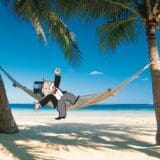
A broad-based coalition today launched an effort to reform Proposition 13, the 1978 law passed by voters that many critics believe imposed a fiscal stranglehold on the Golden State.
The strategy of the “Make It Fair” coalition is clear – to split the business community while keeping homeowners on the sidelines. In doing so, advocates have put themselves in a strong position to challenge what has been called the third rail of California politics.
“Make It Fair” is proposing a critical change to the state’s tax law: closing loopholes that have allowed commercial properties to be taxed at nearly the same level as they were in 1975 (tax rates for residential property would remain unchanged). The coalition claims that California could gain an additional $9 billion a year if these loopholes are eliminated – revenue that could be used for schools, social services,
» Read more about: New Prop. 13 Reform Effort Could Succeed by Splitting Business Interests »


Emeryville, California is more than a brief Amtrak stop across the bay from San Francisco. On Tuesday evening all five Emeryville City Councilmembers approved an ordinance that increases the minimum wage for workers employed at small firms to $12.25 an hour, effective July 1. Employees at Emeryville companies with more than 55 employees, such as Home Depot and Ikea, will earn a minimum wage of $14.44 an hour, also to begin July 1.
“This is a momentous occasion for the city of Emeryville,” Jennifer Lin, deputy director of the East Bay Alliance for a Sustainable Economy, told Capital & Main by phone. “Many of the city councilmembers in their deliberations spoke about the need to address income inequality, to give workers a leg out of poverty.”
California’s current hourly minimum wage is $9, an increase of $1 over 2014. Meanwhile, the Golden State’s rate of poverty in 2013 was 23.4 percent,
» Read more about: Emeryville Joins Movement to Raise Minimum Wage »


“If we’re serious about fighting inequality, we need to understand it and track it to see how we’re doing,” Dr. Annette Bernhardt tells Capital & Main. Bernhardt is the lead author of Low Wage Work in California: 2014 Chartbook, the first of what will be an annual report from the University of California, Berkeley Labor Center. “Our goal was to show that the story of inequality isn’t just about the top one percent; it’s also about the millions of low-wage workers and their families who struggle with economic insecurity every day.”
Bernhardt and co-authors Ian Perry and Lindsay Cattell have assembled a detailed yet accessible profile of California’s low-wage workers – those earning less than $13.63 per hour in 2014, which is two-thirds of the state’s median hourly wage. A third of California workers, about 4.7 million, fell below that standard last year.
» Read more about: Report: State's Low-Income Workers Are Falling Behind »
Move lips, move minds and make new meanings flare.
— Seamus Heaney, “Beacons at Bealtaine”
During a time of political optimism in Northern Ireland when the peace process was beginning to take hold, Irish poet and Nobel laureate Seamus Heaney gave a talk at Queens University in Belfast about the potential power of poetic language. In a place where the “idioms of suspicion and accusation” were insidious and entrenched, Heaney hoped that a fluid approach to identity and language might provide an escape route from binary thinking and the “weary twisted emotions” of Northern Ireland’s “troubles.”
Heaney suggested that it was poets and other writers who could provide a “re-angling of perception” that might loosen the stranglehold the sectarian psyche had imposed upon the linguistic and political landscape. Given some room to move, a more unruly vocabulary could surface where Catholics might regard themselves as “Catestants,” and Protestants could see themselves as “Protholics” —
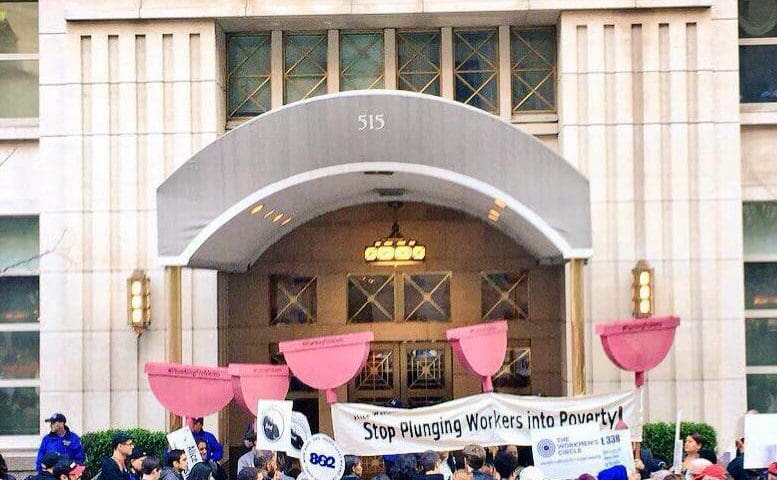
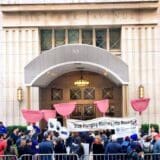
René Bobadilla had just started lunch on April 13 when he got a call from Walmart’s government relations office.
“I almost choked,” he says.
Bobadilla is the city manager of Pico Rivera and the government relations rep had just informed him that the local Walmart Supercenter was shutting down within hours and possibly for six months — due to a plumbing issue.
That meant 530 workers cut at Pico Rivera’s second-largest employer and a severe budget hit to the San Gabriel Valley city of 63,000. Sales tax from the Supercenter accounts for some 10 percent of city revenues — an estimated $1.4 million a year.
The nature of the problem is a mystery.
“They haven’t told us specifically — is it their main, do they have water coming out of their drain? I don’t know,” Bobadilla says.
The Pico Rivera store is one of five Walmart stores around the country suddenly closed due to vaguely defined plumbing problems.
» Read more about: Walmart's Pico Rivera 'Plumbing Problem' »
This year’s May Day events in Los Angeles are grouped around the themes of immigration reform and raising the minimum wage. Below is an updated list of events, provided by the Los Angeles May Day Coalition and other sources. Note: Michael Brown Sr., father of the teenager shot and killed last year in Ferguson, Missouri, will join the #MayDaySolidarity march meeting in Downtown L.A., at the Chinatown Gateway (Broadway & Cesar Chavez Ave.) shortly before 3 p.m. Tom Morello, activist, singer and guitarist for Rage Against the Machine and Audioslave, will join the march once it approaches the Metropolitan Detention Center (Aliso & Alameda streets) around 4 p.m.
Schedule of events:
2 p.m. – 3 p.m.: People gather at Dragon’s Gate, Chinatown, corner of Broadway & Cesar Chavez Ave.
3:15 p.m.– 3:45 p.m.: May Day Rally & program begins
Brief presentations and music. Speakers include elected officials such as L.A.
» Read more about: Tom Morello, Michael Brown Sr. to Join May Day Events »


Charles Gladden has held his current job for eight years. The 63 year old sweeps floors, cleans dishes and mops bathrooms. His take-home pay is about $360 a week and he is currently homeless, moving between shelters and occasionally a Metro stop next to the White House.
Bertrand Olotara is a college graduate and a single father. After being laid off, he now earns $12 an hour as a cook and has a second job which often means he works up to 70 hours a week. Despite these two jobs, he is eligible for food stamps that help him feed his family.
These stories of America’s working poor aren’t anything new, but you may be surprised to learn where they work: the United States Senate. When the Senate privatized food service in their cafeterias and dining rooms, formerly living-wage jobs were converted into poverty-level positions through for-profit contractors like Restaurant Associates and Compass Group.
Rupert Murdoch’s News Corporation has a digital education division called Amplify. A Bloomberg News article, “News Corp.’s $1 Billion Plan to Overhaul Education Is Riddled With Failures,” outlines the company’s efforts to cash in on education without positive results. Read more here.
Other news:
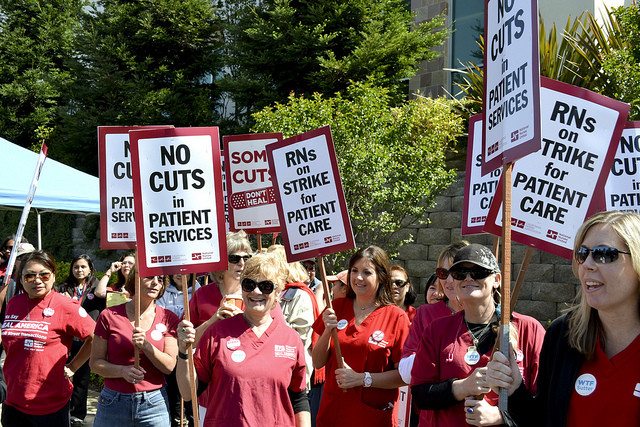

More than 5,000 registered nurses belonging to the California Nurses Association (CNA) are striking today at eight California hospitals, with a somewhat smaller number continuing the strikes Friday. The nurses are demanding that hospitals provide adequate staffing levels which are now, they claim, endangering patients. (Disclosure: CNA is a financial supporter of Capital & Main.)
Hospitals affected by the strike are: Los Angeles Medical Center (Kaiser Permanente); Providence Little Company of Mary Medical Center Torrance; Providence Saint John’s Health Center; Mills-Peninsula Health Services (Sutter); Sutter Auburn Faith Hospital; Sutter Roseville Medical Center; Sutter Santa Rosa Regional Hospital and Sutter Tracy Community Hospital.
Sue Robbins, a registered nurse who has worked at Sutter Roseville Medical Center for 14 years, says this is her first strike and it’s also the first time a strike has taken place at her hospital, located north of Sacramento.
Robbins says that a rehab center that served the community is gone and that Sutter’s management wants to eliminate “baby nurses” —
» Read more about: Nurses at Eight California Hospitals Strike to Demand Adequate Staffing »


On the last stop on their road trip through California, Maria Bustillos and Elizabeth Fladung discuss inequality and gentrification in San Francisco, heart of the tech industry and one of the most unequal cities in the country.
This podcast is an encore posting from our State of Inequality series.
Maria Bustillos is a journalist and critic living in Los Angeles.
Elizabeth Fladung is a Brooklyn-based, CalArts-trained photojournalist. Her work has appeared in The Nation, La Repubblica, The Fader and Wax Poetics Magazine.
» Read more about: Podcast: 'Disruptors' and Gentrification »
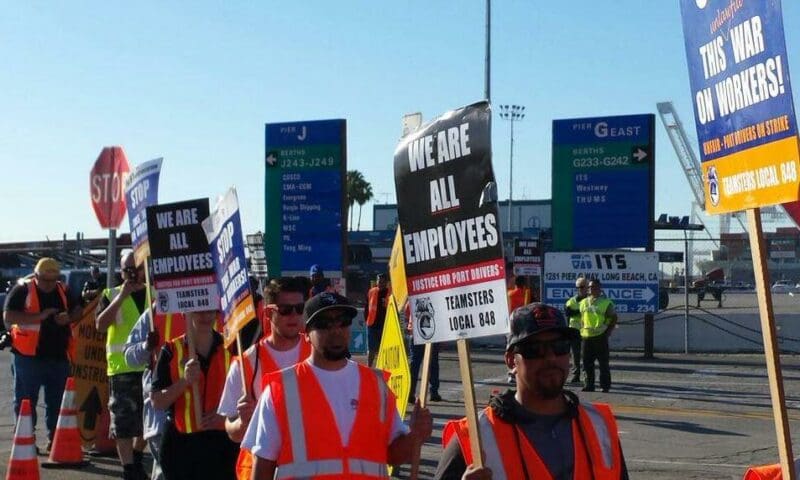
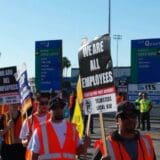
As the strike by a couple hundred harbor truck drivers enters its third day, work stoppages have spread to a Union Pacific rail yard located in Lincoln Heights, just east of downtown Los Angeles. A rally will be held there today, Wednesday, April 29, to protest the theft of the drivers’ wages by port hauling firms. It takes place 2:30-4 p.m. at the Union Pacific Railroad Trailer and Container Intermodal Facility, 1041 Richmond Street.
At the heart of the dispute is the continuing fight of short-haul drivers to be classified as company employees by the trucking firms they work for. Currently, most drivers are considered “independent contractors,” a job category that denies the drivers basic labor benefits and rights, while placing on them the costly burden of paying for the maintenance, fuel and insurance for their vehicles.
On Monday, drivers for Pacific 9 Transportation, Intermodal Bridge Transport,


Maria Bustillos and Elizabeth Fladung debrief their day reporting on inequality in Silicon Valley, including their experiences visiting with some groups and leaders helping local people left out of the tech boom.
This podcast is an encore posting from our State of Inequality series.
Maria Bustillos is a journalist and critic living in Los Angeles.
Elizabeth Fladung is a Brooklyn-based, CalArts-trained photojournalist. Her work has appeared in The Nation, La Repubblica, The Fader and Wax Poetics Magazine.
» Read more about: Podcast: Silicon Valley's Stark Contrasts »
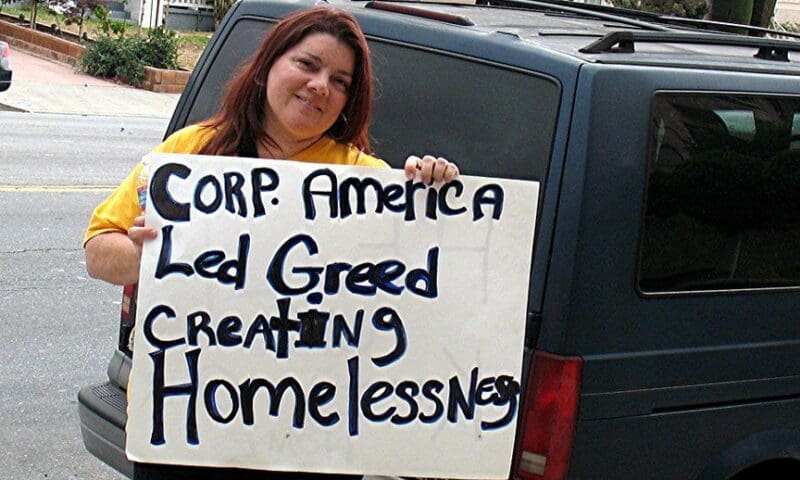

For Catherine Green, home for the last three decades has been a comfortable apartment in the sprawling 43-unit Boulevard Villa near Crenshaw and Venice boulevards in Mid-City Los Angeles. Her alert gaze, energetic demeanor and perfect posture give no hint of a life that’s spanned 90 years. “I was one of the first people to move in here,” she says with a strained smile. “I’ve seen ’em come, and I’ve seen ’em go. This is my community, my village.”
Tanya Rhodes, a retired nurse, and her disabled daughter also call this place home, and have done so for the last 22 years. Louis Gates, a sturdy man with a steely glare, is a Vietnam vet who relocated here five years ago. Between nervous puffs on a cigarette, he expresses how happy he was when he moved in, and says sadly, “I thought this was going to be the last place I would move into.” If the winds of fortune do not change soon,
» Read more about: As L.A.'s Rents Rise: Crenshaw Tenants Battle Eviction »